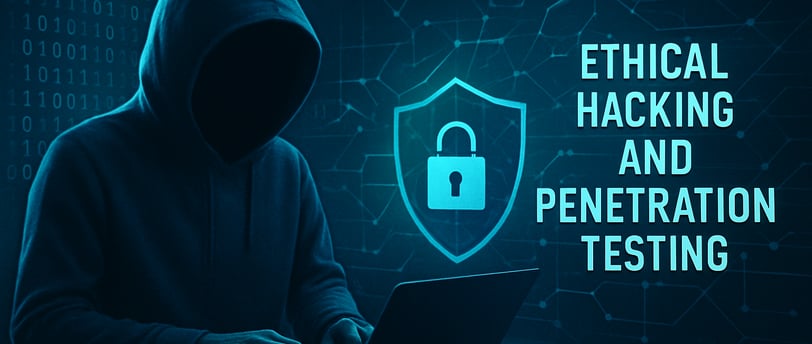Why Ethical Hacking and Penetration Testing Are More Critical Than Ever
In today’s rapidly evolving threat landscape, waiting for a breach to happen is not an option. Ethical hacking and penetration testing provide organizations with the critical insights needed to proactively identify and address vulnerabilities—protecting data, reputation, and business continuity. Discover why integrating these practices into your cybersecurity strategy is essential for staying ahead of increasingly sophisticated cyber threats.
CYBERSECURITYPENETRATION TESTING
Sumit Bhartiya
5/27/20252 min read


In today’s hyper-connected world, cyber threats are no longer a matter of if but when. Every day, hackers are probing for weaknesses—whether in global enterprises, small businesses, or critical infrastructure. The good news? The defenders have their own hackers too: ethical hackers.
What is Ethical Hacking?
Ethical hacking, sometimes called white-hat hacking, is the art of intentionally probing systems for weaknesses, with permission. These professionals use the same tools and tactics as malicious hackers, but for one purpose only: to protect.
What is Penetration Testing?
Penetration testing—or pentesting—is a focused version of ethical hacking. Think of it as a controlled cyberattack. The goal is to uncover security flaws before real attackers do. It’s how organizations stress-test their defenses, applications, and internal processes.
Why This Matters More Than Ever
1. Cybercrime Is Exploding
Cyberattacks are now one of the most lucrative and low-risk crimes globally. From ransomware targeting hospitals to phishing schemes against remote workers, the threat is everywhere. Ethical hackers help uncover and close the gaps before criminals find them.
2. Attack Surfaces Are Growing
With more devices, cloud platforms, and remote access points than ever, organizations have massive digital footprints. Each new endpoint is a potential entry point. Penetration testing helps identify and secure the weak links.
3. Regulations Demand It
Compliance standards like GDPR, HIPAA, PCI-DSS, and ISO 27001 all require regular security assessments. Pentesting isn’t just smart—it’s often mandatory.
4. It’s Proactive Security
Instead of waiting for a breach to occur, ethical hacking helps businesses find and fix vulnerabilities ahead of time. Prevention is always cheaper—and less damaging—than recovery.
5. Customer Trust is Everything
A single data breach can erode years of brand trust. Ethical hacking shows your customers and stakeholders that you take security seriously.
Real-World Pentesting: What’s Involved?
Penetration testing can cover a wide range of scenarios:
Network Testing: Can an attacker break into your network?
Web App Testing: Are your websites and APIs secure?
Social Engineering: Would your employees fall for a phishing email?
Physical Security Testing: Can someone walk into your office and plug into your network?
Each test provides detailed insights into what needs to be fixed—before an actual attack occurs.
The Ethical Hacker’s Role in Modern Security
Ethical hackers are no longer fringe actors—they’re frontline defenders. They:
Simulate attacks to expose real-world risks.
Help developers write more secure code.
Train IT teams with realistic threat scenarios.
Contribute during digital forensics investigations.
As threats evolve, their expertise becomes more critical every day.
Final Thoughts
Cybersecurity isn’t just about firewalls and antivirus software. It’s about thinking like an attacker to stay one step ahead. Ethical hacking and penetration testing bring that mindset to your defense strategy—safely and legally.
If your organization hasn’t embraced this yet, now is the time. The threats are real. The risks are rising. And the cost of inaction is too high to ignore.
My Mantra
Shielding your business with precision-crafted cyber defense
Consulting
hello@sumitbhartiya.com
© 2025 Sumit Bhartiya. All rights reserved.
